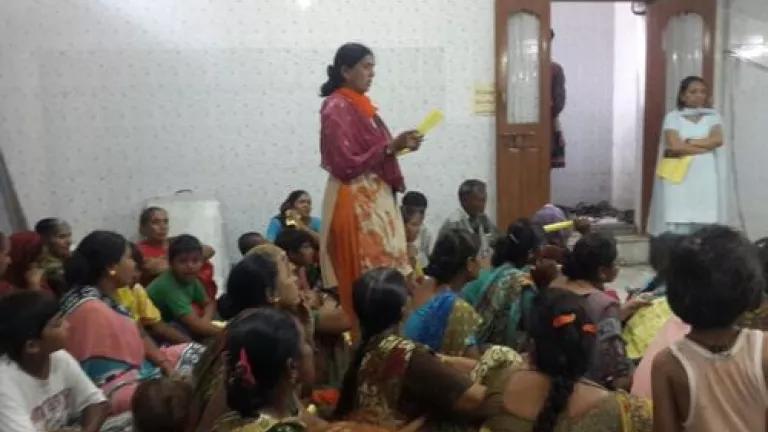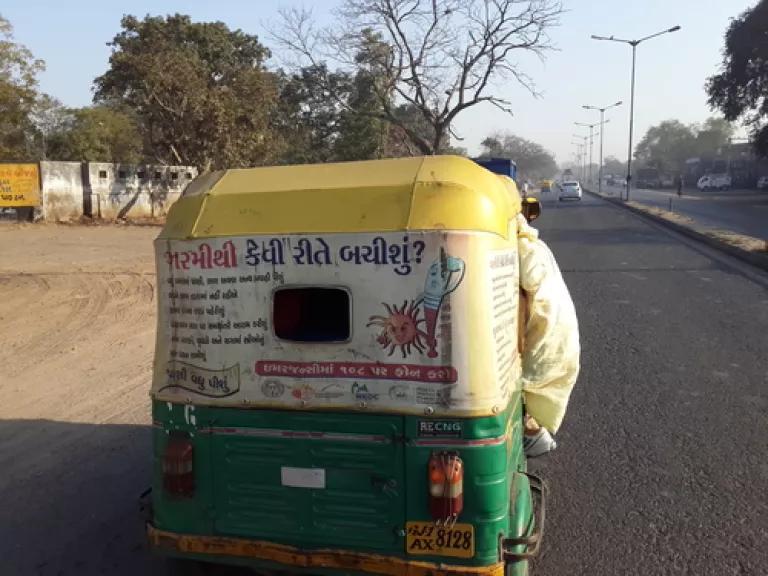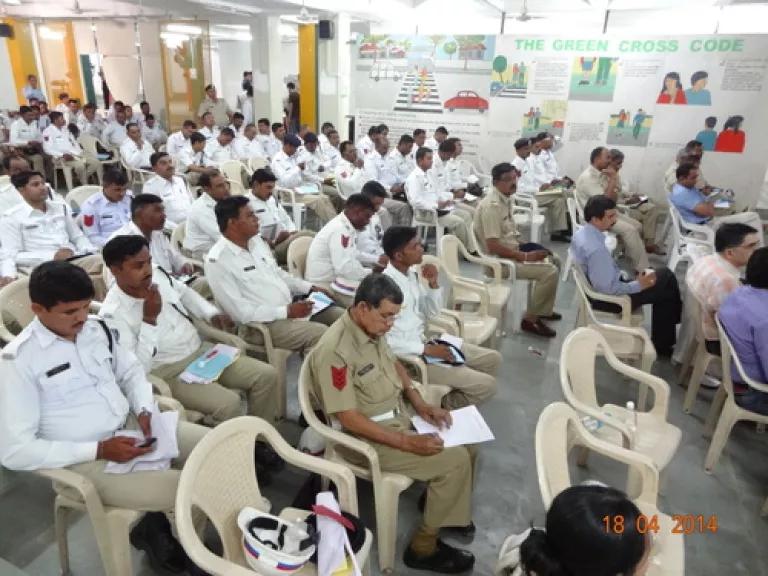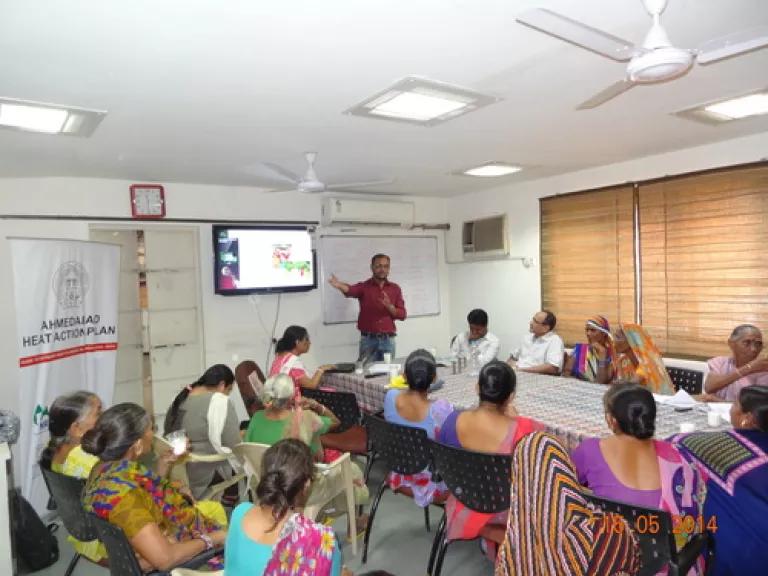
This week India’s new Prime Minister Narendra Modi takes charge of the country. Things have started moving in the country already with the new PM inviting the heads of all SAARC nations to attend the oath taking ceremony. But what of Gujarat, the state he no longer heads as the Chief Minister. The new Chief Minister for the state of Gujarat is Anandiben Patel and at the moment, the state’s largest city, Ahmedabad is facing scorching temperatures over 44 degrees Celsius (111 degrees Fahrenheit). Ahmedabad and local leaders are preparing communities to from the extreme heat through an innovative early warning system as part of the Ahmedabad Heat Action Plan 2014.
In this extremely hot summer in India, the Ahmedabad Municipal Corporation in safeguarding the citizens from extreme heat by taking significant action to administer the Ahmedabad Heat Action Plan – a resilience building system against effects of extreme heat waves in the city. The key efforts focus on community outreach and education, forecasting and early warning and research and surveillance. The activities focus on the most vulnerable groups – rag pickers, traffic police, and children.
Heat health awareness workshop with SEWA rag pickers May 2014. Photo IIPH/NRDC
Information, Education & Communication (IEC) Activities
Key groups such as slum dwellers, construction workers, rag pickers, street vendors and officials such as traffic policemen who have to face tough and extreme physical conditions for their livelihoods are especially vulnerable to the effects of extreme heat. These groups have been identified and special training workshops have been organized to sensitize these groups on the dangers of extreme heat. Each workshop is customized on the basis of the target audience. For instance, workshops for traffic policemen not only sensitize policemen to identify heat illness of citizens in busy traffic areas, but also safeguard their own health to be able to serve the city better.

Auto rickshaw with public health message on extreme heat in Gujarati. Photo: IIPH/NRDC
The Public Health Foundation of India – Indian Institute of Public Health, Gandhinagar (PHFI-IIPH) and NRDC have conducted two workshops with the Self Employed Women’s Association (SEWA) – a trade union of self-employed low-income women workers that organizes these women into powerful groups. These workshops have been targeted to sensitize rag pickers, street vendors as well as home-based workers (self-employed women). In addition to sensitizing these groups, the workshops solicit engagement and participation from these groups as well. A video of the extreme heat wave in May of 2010 and actions taken by the medical professionals during those days has been played to provide a good sense of the dangers of extreme heat. Special advice for children has been communicated to the audience as well.
Take home pamphlets have been distributed in schools across the city so that school children going on summer vacation are aware of action points to be taken during a heat wave. Hoardings and billboards with key messaging have been deployed across the city. Key junctions and busy traffic areas as well as the AMC main office building have LED screens with temperatures and warning messages running at all times. Since March of this year, auto rickshaws and buses have been pasted with posters advising citizens on certain simple actions such as keeping themselves hydrated at all times.

Traffic police heat health awareness workshop May 2014. Photo: IIPH/NRDC
Early Warning & Forecasting
A crucial element to building resilience against extreme heat waves is the predictability of heat wave in the city – linked therefore, directly to forecasting. The AMC is receiving regular alerts from both the Indian Meteorological Department (IMD) and GeorgiaTech University in Atlanta to keep a close eye on the forecasted temperatures. In the summer of 2014, the IMD has also started providing an indicative six day forecast in the city of Ahmedabad.
The AMC is using colour coded alert levels to make sure that a warning to all medical centres, emergency services (108 Ambulance) and citizens (through press notes) can be distributed as soon as an imminent heat wave is identified. Led by the Ahmedabad Health Department, the city agencies are coordinating action and preparedness to protect communities through outreach in schools, parks, hospitals and urban health centres.

Dr. ABhiyant Tiwari, IIPH, leading SEWA workshop May 2014. Photo: IIPH/NRDC
Research & Surveillance Activities
PHFI-IIPH and NRDC are undertaking research activities to further breakdown the health effects of extreme heat. We have been working with construction labour – as one of the identified vulnerable groups in the city. We are currently undertaking a survey to identify which illnesses are more prevalent during the heat season in order to deepen the scientific evidence regarding the health effects of extreme heat.
Further, the AMC Health Department is keeping a close eye on recorded illnesses in the public hospitals of Ahmedabad. All hospitals have been asked to report cases of heat stroke to the AMC Health Department. Mortality data is also being recorded so that any abnormal rise in the deaths can be identified in relation to peak temperatures during those days.
The strength of the Heat Action Plan is rooted in the foundation of inter-agency communication. We find that the various departments – labour, health, traffic – within the city government as well as social organizations that lead the link workers who work with vulnerable groups across the city is providing the bedrock for the successful implementation of the Plan in Ahmedabad in 2014 as well as the years in the future. And, this week, Ahmedabad is sharing its knowledge around the world, with Dr. Tejas Shah, the AMC Medical Officer, presenting our work at Resilient Cities 2014 in Germany, hosted by the Climate Development and Knowledge Network and ICLEI. Together city government can work strengthen community resilience against the coming heat waves around the globe in 2014.
Nehmat Kaur is a NRDC India Representative based in New Delhi.
